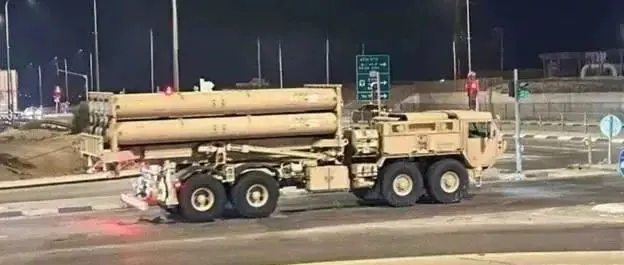Deploying THAAD, is the US not pretending anymore?

On [date], the U.S. THAAD anti-missile system and its advance team arrived in Israel, expected to be operational within days. This marks the first time the U.S. has deployed troops to Israel since the outbreak of the new round of Israel-Palestine conflict on [date]. It is also the second time the THAAD missile defense system has entered this highly conflict-prone region. At a time when Iran and Israel are on the brink of war and the Middle East is increasingly engulfed in flames, the U.S. move is akin to pouring oil on the fire.
On a certain date, an Israeli TV station revealed a photo of a THAAD anti-missile system launch vehicle driving on the streets of Israel. What is the United States trying to achieve? To ensure the "security of its allies." Currently, Israel is in a tense situation of seven-front warfare, having to simultaneously address military threats from multiple directions. In the face of rocket and ballistic missile attacks, Israel has deployed the Iron Dome and David's Sling air defense systems, but their performance in countering Iranian missile strikes has been less than ideal. The THAAD, as an advanced U.S. anti-missile system, is capable of intercepting medium-range missiles at high altitudes, providing additional protection for Israel. By supporting Israel's defensive capabilities, the United States is undoubtedly warning all parties in the Middle East that any provocations against Israel will face direct retaliation from the U.S.
Expressing "American Support". In the United States, the Jewish community holds a pivotal position, wielding significant influence in numerous fields such as defense, economy, finance, and media. As the U.S. presidential election draws near, both major parties have shown rare unanimity in their support for Israel to win over Jewish voters and financial groups. On the Republican side, although Trump initially supported tough actions against Israel during the conflict, his stance quickly shifted to emphasizing support for Israel and promising to expel Palestinian immigrants if elected. On the Democratic side, despite internal divisions over Israel policy, they have also pledged to strengthen the U.S.-Israel alliance, increase military aid, and deepen security cooperation to gain electoral advantages. This pro-Israel inclination is not only reflected in policy statements but also in economic aid and military support, with the deployment of the THAAD system being the most powerful illustration.
Strengthening "Global Militarization." In recent years, the United States has used the THAAD system as a crucial tool to enhance its global military presence, promoting its deployment in multiple countries and regions. This time, the deployment of the THAAD anti-missile system in Israel not only sends a signal of "firm support for Israel" but also reflects the U.S. attempt to expand its military presence in the Middle East. This is rooted in the consistent logic of U.S. military hegemony: regardless of geographical distance, the United States is willing and capable of exercising its military influence in what it deems as "critical regions."
What impact does THAAD have? Since the outbreak of the current Israel-Palestine conflict, the United States has frequently displayed its ugly double standards. On one hand, the U.S. pretends to be committed to promoting a peaceful resolution to the Israel-Palestine issue, dispatching high-ranking officials to the Middle East for negotiations multiple times, creating an image of a "peace envoy." On the other hand, the U.S. continues to supply weapons to Israel and repeatedly vetoes UN Security Council resolutions calling for a ceasefire, attempting to prevent international pressure on Israel. This time, the U.S. deploying THAAD in Israel itself undoubtedly rips off the mask of hypocrisy. Such blatant support will not only embolden Israel in its military actions but also weaken Iran's strategic deterrence against Israel, forcing it to accelerate its search for countermeasures, potentially leading it further down the path of developing advanced missiles and even nuclear weapons. The U.S.'s so-called "strengthening defense" is actually pouring oil on the fire, likely to evolve into a vicious arms race or even the spark for the sixth Middle East war...

